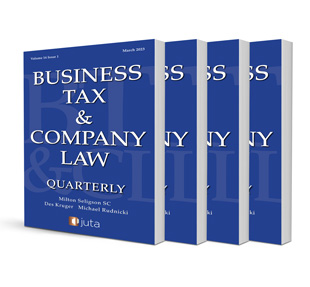South Africa’s Ambiguous Exchange Control Climate

South Africa’s Ambiguous Exchange Control Climate
Author: Robyn Berger & Esther Geldenhuys
ISSN: 2219-1585
Affiliations: Tax Executive, Bowmans Attorneys; Senior Associate, Bowmans Attorneys
Source: Business Tax & Company Law Quarterly, Volume 14 Issue 3, 2023, p. 15 – 22
Abstract
Although the South African Minister of Finance announced in the 2020 Budget speech that sweeping reforms would be enacted to relax the South African exchange control system, it is now three years later, and no meaningful relaxation of exchange control has occurred. Rather, investment into South Africa remains plagued by exchange control laws, which result in costly and time-consuming processes for foreign investors. In January 2021, a long-awaited change to the exchange control rules was enacted, with the relaxation of the so-called ‘loop structure’ rules. Many investors jumped at the opportunity to take advantage of this relaxation and restructured their existing South African assets so that they would be owned by approved foreign structures. The relevant parties then, in line with the prescribed rules, reported the transactions to the Financial Surveillance Department of the South African Reserve Bank (FinSurv), via their Authorised Dealers. The FinSurv did not simply acknowledge receipt of the reported information as expected under the law. Rather, the FinSurv elected to reject applications submitted under the respective circular, without withdrawing the circular, leading to much uncertainty in the market, especially for those investors who have already restructured their assets, triggered taxes on the restructure and paid the taxes. Further, it appears that South Africa’s negative rating and greylisting, by the Financial Action Task Force (FATF), has triggered a stricter application of the existing exchange control regime, with more frequent application of the penalty regime by the FinSurv to identified contraventions. In the past, South African corporates were able to regularise an exchange control contravention with the FinSurv without difficulty. The process was relatively straight forward. However, lately, the responses received from the FinSurv to requests for regularisation (including to standard commercial transactions) are vague with the result that the matter does not seem to reach finalisation. The responses provided suggest that the applicant may still be subject to further investigation and ultimately may be subject to financial penalties. This is only one of the challenges such applicants face.